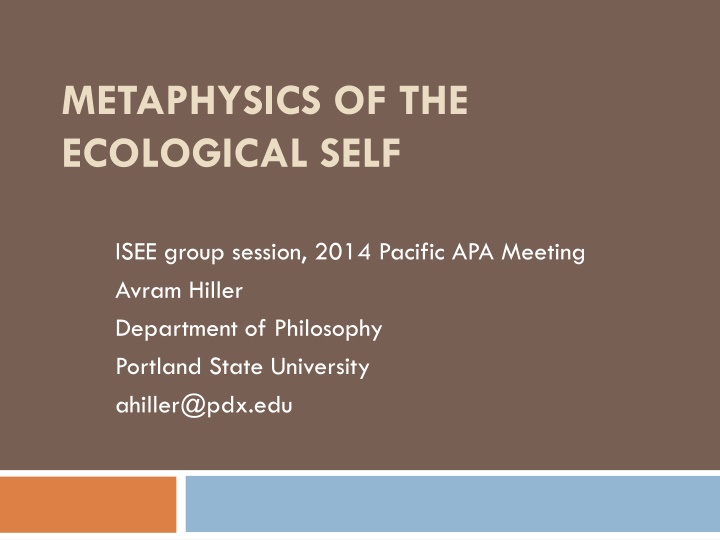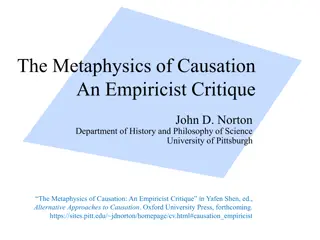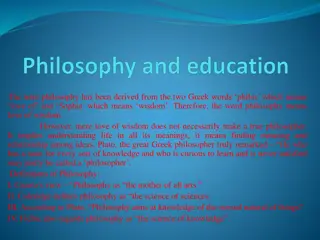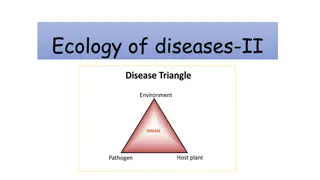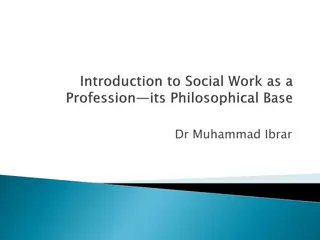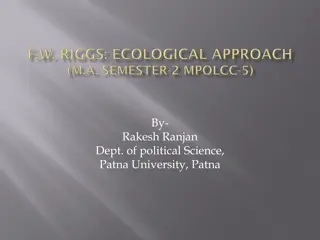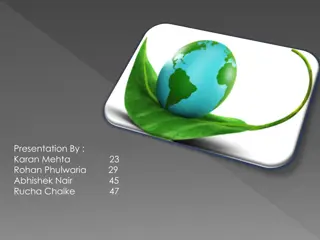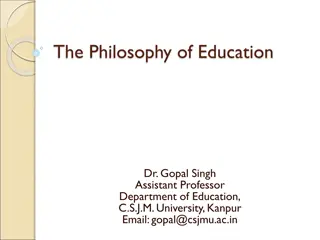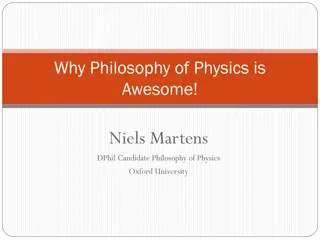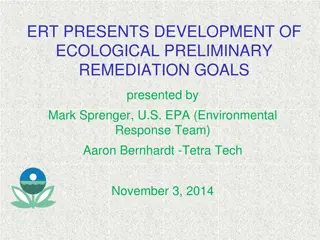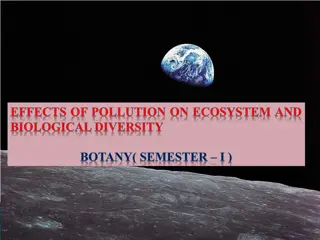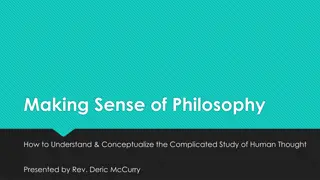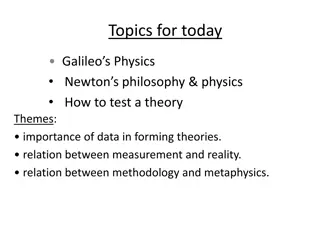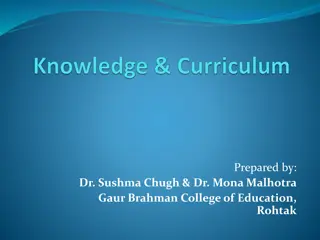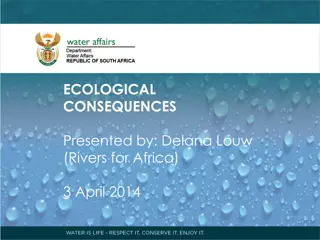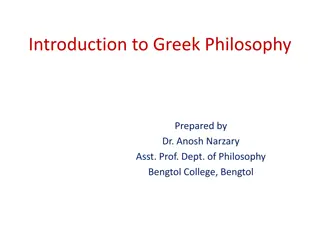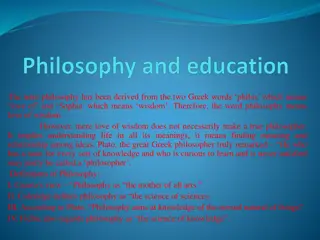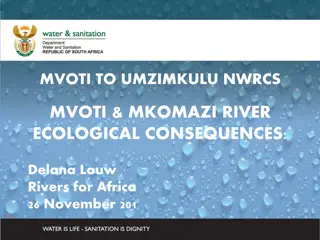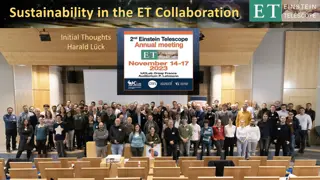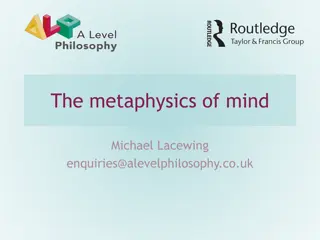Metaphysics of the Ecological Self and Monism in Philosophy
The discussion explores the concept of the ecological self in deep ecology and the interplay with contemporary analytic philosophies like monism. It proposes a moderate view that acknowledges internal dependence relations between humans and the environment, grounding normative claims about human-environment connections.
Download Presentation

Please find below an Image/Link to download the presentation.
The content on the website is provided AS IS for your information and personal use only. It may not be sold, licensed, or shared on other websites without obtaining consent from the author.If you encounter any issues during the download, it is possible that the publisher has removed the file from their server.
You are allowed to download the files provided on this website for personal or commercial use, subject to the condition that they are used lawfully. All files are the property of their respective owners.
The content on the website is provided AS IS for your information and personal use only. It may not be sold, licensed, or shared on other websites without obtaining consent from the author.
E N D
Presentation Transcript
METAPHYSICS OF THE ECOLOGICAL SELF ISEE group session, 2014 Pacific APA Meeting Avram Hiller Department of Philosophy Portland State University ahiller@pdx.edu
Abstract The idea of the ecological self is prominent within deep ecology, as in the work of Arne Naess, Freya Mathews, and William Devall. On this view, to realize one s true Self (which Naess capitalizes) is to recognize that we are all one with everything else that exists. However, nowadays most philosophers and even most environmental philosophers reject this neo-Spinozistic metaphysics. At the same time, several philosophers working squarely within the analytic tradition have revitalized some similar notions. For instance, Jonathan Schaffer writes in a 2010 article in Mind of the Internal Relatedness of All Things and Schaffer, Kit Fine, E. J. Lowe, and others have written extensively over the last fifteen years about monism and ontological dependence. This paper is an attempt to fashion a metaphysical view of the ecological self which combines insights from both the deep ecological and contemporary analytic traditions. The result is a moderate view which rejects Naess s and Schaffer s claims that all things are internally related but still maintains that there are some internal dependence relations between humans and the non-human world. Ecology, after all, is the specific study of the interactions of organisms and facets of their environments, and thus to escalate the ecological self to a cosmic claim that all things are interrelated is excessive. Still, one can use this more metaphysically modest notion of the ecological self to ground certain normative claims about the kinds of connections that humans should have with each other and with the environment.
(Metaphysical) Monism Consider Socrates alongside his limbs and organs. Which is prior in this case? A hard question! According to Aristotle at least, Socrates is prior, with the many parts of his body being what they are in virtue of their integration in the whole. The classical monist views the world this way. Jonathan Schaffer, The Internal Relatedness of All Things, p. 345
(Metaphysical) Monism [E]verything in the universe is bound up with everything else in a network of relations which penetrate into their being and make them what they are. Change a thing and you change its relations; you change, therefore, everything in the universe. Change the relations of a thing and you change the thing. The universe, on this view, may be likened to an enormous reverberating chamber, in which any whisper, however faint, in any part, however remote, echoes and re-echoes throughout the whole. (Joad 1936, pp. 414 15, quoted by Schaffer, p. 370)
A List of Some (Arguable) Monists Parmenides Josiah Royce Religious traditions: Buddhists/Zen Buddhists Taoists Hindus Transcendentalists F. H. Bradley John Muir Arne Naess Devall and Sessions J. Baird Callicott Indigenous peoples all over the world Freya Mathews Terry Horgan Spinoza Jonathan Schaffer Hegel
Existence Monism vs. Priority Monism Schaffer s distinction Existence monism: There is only one thing. Priority monism: There are many things, but the whole is ontologically prior to all other things.
Existence Monism vs. Priority Monism Although Naess is sometimes unclear about this, priority monism is all that is needed. Mathews: [I]nterconnectedness does not imply that organisms do not possess a genuine individuality; their functional unity confers on them an essential ontological distinctiveness and integrity. p. 127 in Drengson and Inoue Thus deep ecologists may still maintain that there are individual things
Internal relations Relations which are necessary/essential to individuals That I am taller than my sister is a relation, but not an internal relation. That I was born to the parents to whom I was born is, arguably, an internal relation. That is to say, just as being a rational being is (arguably) essential to me, being born to the parents to whom I was born is essential. Perhaps being a human is essential to me; but depending on how being a human is construed, perhaps it is a property, or perhaps it is a relation
Why accept monism? Schaffer s main arguments: 1. Causal essentialism All things are causally linked to each other (through the big bang, and through gravity), and arguably, causal relations are essential to things
Why accept monism? 2. Spatiotemporal relatedness (given structuralist supersubstantivalism) (i) the supersubstantivalist thesis that actual concrete objects are identical to regions of space-time, with (ii) the structuralist thesis that space-time regions possess their distance relations essentially.
Why accept monism? 3. Quantum entanglement Since any particle has certainly interacted with other particles in the past, the world turns out to be nonseparable into individual and independent objects. The world is in some way a single object. (Toraldo di Francia, quoted by Schaffer 2014) Also see Callicott and Mathews making similar arguments
Why accept monism? 4. Worldmate-relatedness (given Lewisian counterpart theory) If individuals only exist in one specific possible world, then they are necessarily connected to all (and only) those other things which exist in that world.
Why accept monism? 5. The argument from gunk ( Gunk refers to stuff which is endlessly divisible) Either the ultimate parts must be basic at all worlds, or the ultimate whole must be basic at all worlds. There are gunky worlds without ultimate parts (and hence no ultimate parts to be basic at those worlds). Therefore, the ultimate whole must be basic at all worlds.
From monism to the ecological self Nature is a unity, a whole, and the self, the "I" (mentally as well as physically construed), is not only continuous with it, but constituted by it. Nature and I are conceptually as well as metaphysically integrated. J. Baird Callicott, "Intrinsic Value, Quantum Theory, and Environmental Ethics," 273-274.
From the ecological self to ecological ethics/environmentalism Hume: One can t derive an ought from an is. Mathews denies this (see ES 119-120); she claims that the fact/value distinction arises from an individualist metaphysics I don t see why this is the case Nevertheless, deep ecologists use the notion of the ecological self to argue that we ought to preserve nature. One must go through a process of Self- realization. In doing so, one will recognize that one is One with the rest of the world, and want to not destroy it.
From the ecological self to ecological ethics/environmentalism For Naess, ethics is removed from the equation; what remains is concern for one s Self (i.e., the world) This seems to accept the extreme doctrine of existence monism rather than priority monism, even though in some places Naess only argues for priority monism.
Does the ecological self go too far? Monists cases for internal relatedness of all things are all highly controversial. Mere ecological essentialism (as below) is more palatable. The idea that everything is necessarily interconnected trivializes interconnectedness; we find no environmental ethic in Parmenides, Horgan, or Schaffer. If it s the entire cosmos which is a whole, why does it matter what happens to organisms and ecosystems? The cosmos will survive our meddling with Earth. Ecology is the study of organisms in their environments. Distant planets, for instance, are explanatorily irrelevant to ecology even if they exert some gravitational force. Also, what does the self mean in the first place from the view of quantum physics? What is agency? What is it to be human? Mathews (103-104): We, and the cosmos, have a conatus (striving), as Spinoza claims. AH: It is unclear how that solves the ethical issues.
Synchronic vs. Diachronic Ecological Self Synchronic: At any time t, subject S bears necessary internal relations to the environment around S at t. Diachronici(individual): Subject S bears necessary internal relations to the environment in which S has lived. Diachronice(evolutionary): Subject S bears necessary internal relations to the environment in which S s kind developed.
An Argument for the Diachronic (Evolutionary) Ecological Self Diachronice(evolutionary): Subject S bears necessary internal relations to the environment in which S s kind developed. Persons are organisms An organism can only be understood in terms of its kind Kinds (of organisms) can only be understood in terms of their evolutionary history Evolutionary history is a history within an environment If an individual can only be understood in terms of something else, then the individual is internally related to that thing Therefore, persons are internally related to the human evolutionary environment. 1. 2. 3. 4. 5. 6.
Further clarifications If a person is internally related to an environment, one must understand the self ecologically. There is a constant dimension of whether a human life is properly related to the external world. There is a scale of appropriateness, relative to humans evolutionary environment.
The ecological self in psychology Some psychologists use the notion of the ecological self simply to represent the fact that environmental factors play a significant causal role in human psychology. However, others, following the work J. J. Gibson on perception, claim that the is something necessary about human ecology which is part of who we are. This latter notion is close to the notion of the ecological self I support.
The moderate ecological self The claim that selfhood is ecological is the claim that an essential aspect of (human) selfhood is the interrelatedness between humans and our environment. In other words, to understand what it is to be a (human) self requires (in part) an understanding of human ecology. But this does not claim that there are internal dependence relations between humans and distant galaxies.
From the moderate ecological self to ecological ethics Even though is does not imply ought , the notion that humans are essentially ecological should make us reconceive the human good. Perhaps one can derive an ought from a necessarily is . Prior notions of human good, based upon a metaphysical presumption of strong individualism, are wrongheadedly ethically individualist. More work is needed to explore the precise first- order ethical ramifications of the moderate ecological self.
Objections Bookchin s objections to Deep Ecology: We should focus on improving people s lives and on the social conditions which cause environmental degradation; wilderness value is extravagant Response 1: ecological value is not the only value. Response 2: ecological value is determined in part by individual value, which is determined in part by individual wellbeing
Objections Good arguments favor an internalist psychological criterion of selfhood (e.g. Sydney Shoemaker) rather than an ecological criterion Such arguments do importantly emphasize the value of psychological continuity but do not tell the full story of what it is to be a (human) self
Objections The good for persons must be related to their own chosen ends, rather than to their evolutionary past Response: the good of chosen ends can be weighed as well as goods related to ecological goods
Objections Evolutionary ethics has a sordid history Response: Be careful to avoid claims which are wrongheaded
Objections The evolutionary ecological self has a strange teleology Response: Individualism should also be regarded as being metaphysically strange
Objections Environmentalists adopting an implausible metaphysics will turn people off from wanting to help save the environment Response 1: Many people and cultures already accept the interconnectedness of living things Response 2: Don t use this argument in every context
